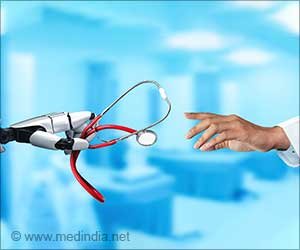AI and ML to Transform PCOS Detection

This conclusion arises from a recent study conducted by the National Institutes of Health (NIH), where researchers systematically analyzed published scientific works employing AI/ML to scrutinize data for diagnosing and categorizing PCOS.
The findings underscore that AI/ML-based programs have shown considerable success in detecting PCOS. Dr. Janet Hall, a senior investigator and endocrinologist at the National Institute of Environmental Health Sciences (NIEHS) and a co-author of the study, emphasized the importance of this discovery, especially considering the widespread issue of under- and misdiagnosed cases of PCOS.
Advertisement
She stated that the effectiveness of AI and machine learning in detecting PCOS surpassed their initial expectations.
Why do Women get PCOS?
PCOS arises from irregular functioning of the ovaries, often accompanied by elevated testosterone levels. This condition can lead to irregular menstrual cycles, acne, excess facial or body hair, and hair thinning.
Additionally, women with PCOS face an elevated risk of developing type 2 diabetes, as well as various sleep, psychological, cardiovascular, and reproductive disorders, including uterine cancer and infertility.
Dr. Skand Shekhar, the senior author of the study, pointed out the diagnostic challenges associated with PCOS due to its overlap with other conditions. He highlighted the potential of integrating AI/ML into electronic health records and clinical settings to enhance the diagnosis and care of women with PCOS.
The study authors proposed amalgamating extensive population-based studies with electronic health data and analyzing common lab tests to pinpoint sensitive biomarkers that can facilitate PCOS diagnosis.
Diagnosis of PCOS relies on established standardized criteria, encompassing clinical features (e.g., acne, excess hair growth, and irregular periods) along with laboratory (e.g., elevated blood testosterone) and radiological findings (e.g., multiple small cysts and increased ovarian volume detected through ovarian ultrasound).
Nevertheless, because some PCOS features may co-occur with other conditions like obesity, diabetes, and cardiometabolic disorders, it often goes undetected.
How Can Artificial Intelligence and Machine Learning Help in PCOS Diagnosis?
AI refers to the utilization of computer-based systems to emulate human intelligence and aid in decision-making or predictions. ML is a subset of AI that focuses on learning from past events and applying that knowledge to future decisions. AI excels at processing extensive and diverse data, including that derived from electronic health records, making it invaluable for diagnosing challenging conditions such as PCOS.
It can aid in the following:
-
Improved Diagnosis:
AI is proving to be highly effective in identifying and diagnosing PCOS. It can analyze a wide array of data, including clinical symptoms, hormone levels, and ultrasound images, leading to more accurate and timely diagnoses
-
Early Intervention:
AI enables early detection of PCOS, allowing for timely intervention and management. This is crucial in preventing associated health complications
-
Personalized Treatment Plans:
AI can analyze large datasets to create personalized treatment plans for individuals with PCOS. This tailored approach can lead to more effective outcomes
-
Reduced Misdiagnoses:
Due to its ability to process extensive and diverse data, AI can help mitigate the issue of under and misdiagnosed cases of PCOS, providing relief to many affected women
-
Integration with Electronic Health Records:
AI can be integrated into electronic health records, streamlining the diagnostic process and ensuring that healthcare providers have access to the most up-to-date information for effective patient care
The researchers conducted a comprehensive review of peer-reviewed studies published over the past 25 years (1997-2022) that utilized AI/ML for PCOS detection. With the assistance of an experienced NIH librarian, they identified potentially eligible studies, ultimately screening 135 studies and incorporating 31 in their analysis.
All the studies were observational and evaluated the application of AI/ML technologies in patient diagnosis, with roughly half of them incorporating ultrasound images. The average age of the participants across the studies was 29.
Of the 10 studies that employed standardized diagnostic criteria for PCOS, detection accuracy ranged from 80% to 90%.
Dr. Skand Shekhar highlighted the study’s key finding, emphasizing the remarkably high performance of AI/ML in detecting PCOS across various diagnostic and classification methods.
The authors underscored the potential of AI/ML-based programs to significantly improve our ability to identify PCOS in women at an early stage, leading to cost savings and reducing the overall burden of PCOS on patients and the healthcare system.
They also noted that subsequent studies with rigorous validation and testing protocols will facilitate the seamless integration of AI/ML for chronic health conditions.
By combining state-of-the-art technology with unwavering human commitment, the diagnosis and treatment of PCOS are no longer shrouded in uncertainty but will be illuminated with exceptional clarity and accuracy.
Reference :
- Application of machine learning and artificial intelligence in the diagnosis and classification of polycystic ovarian syndrome: a systematic review – (https:www.frontiersin.org/articles/10.3389/fendo.2023.1106625/full)
Source: Medindia
Source link
#Transform #PCOS #Detection



